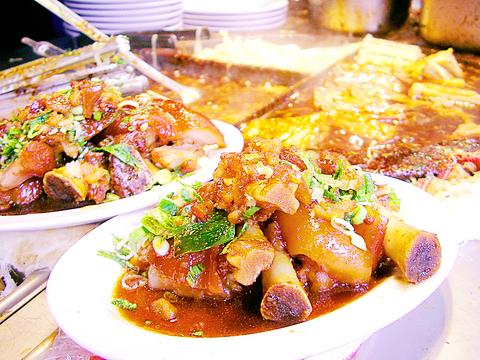Fu Pa Wang means "rich king" in Chinese, but maybe it's more appropriate to call this restaurant the "rich king of pork." It specializes in stewed pork, particularly pig's knuckle and pig's feet. Walking in the vicinity, you can smell the pork cooking long before you reach the restaurant.
It is necessary to arrive at the restaurant at the right time in order to get the restaurant's most popular dish -- pork shank -- which sells rapidly after lunch or dinner service begins. Because of the small size of the restaurant, (just nine tables), it is always full and queuing is almost inevitable. More than 120kg of pork is consumed in this small restaurant every day.
At the front of the restaurant, almost extending into the street, there are two giant pots in which meat is constantly stewing, stimulating your appetite even before you enter.

PHOTO: YU SEN-LUN, TAIPEI TIMES
According to owner Hsieh Tiao-lung (謝調龍), the pork needs to be stewed for four hours. And when serving, the sliced meat or knuckle is placed on small plates, garnished with sauce and chopped garlic shoots. The shoots are less spicy than garlic cloves but give out a light spicy fragrance that compliments the juicy meat and smooth fat and tendon.
The stewed pork is divided into three categories. The most popular, and the quickest to sell out, is pork shank (NT$80), which contains mainly lean meat with a minimum of fat and bone. The second is the knuckle (NT$50). This part has a higher proportion of tendon, making it smoother and more gelatinous. The third kind of meat is a challenge for gluttons, because it's the pure pig feet (NT$50), largely made up of tendon and fat, but for pig's feet lovers, this is the best stuff.
The restaurant offers many side dishes including stewed bamboo shoots, bean curd, egg and bitter melon all stewed in a soy-based thick sauce. An order for one vegetable side dish with pork and a bowl of rice or soup will come to around NT$100.
"My original idea was to recreate the old-time Taiwanese taste I remember from when I was small," Hsieh said. The intention to preserve the old Taiwanese feeling is also reflected in the decor, with wooden tables, long benches, and pottery decorations on the wall. The down side is you can't really sit around and ruminate on the delicious food, for there will always be people waiting for your seat.
Address: 20, Lane 115, Nanking E. Rd., Sec. 2, Taipei (台北市南京東路2段115巷20號)
Telephone: (02) 2507-1918
Open: 11:30am to 8pm
Average meal: NT$120
Details: Chinese menu only. Credit cards not accepted

Jan. 5 to Jan. 11 Of the more than 3,000km of sugar railway that once criss-crossed central and southern Taiwan, just 16.1km remain in operation today. By the time Dafydd Fell began photographing the network in earnest in 1994, it was already well past its heyday. The system had been significantly cut back, leaving behind abandoned stations, rusting rolling stock and crumbling facilities. This reduction continued during the five years of his documentation, adding urgency to his task. As passenger services had already ceased by then, Fell had to wait for the sugarcane harvest season each year, which typically ran from

It’s a good thing that 2025 is over. Yes, I fully expect we will look back on the year with nostalgia, once we have experienced this year and 2027. Traditionally at New Years much discourse is devoted to discussing what happened the previous year. Let’s have a look at what didn’t happen. Many bad things did not happen. The People’s Republic of China (PRC) did not attack Taiwan. We didn’t have a massive, destructive earthquake or drought. We didn’t have a major human pandemic. No widespread unemployment or other destructive social events. Nothing serious was done about Taiwan’s swelling birth rate catastrophe.

Words of the Year are not just interesting, they are telling. They are language and attitude barometers that measure what a country sees as important. The trending vocabulary around AI last year reveals a stark divergence in what each society notices and responds to the technological shift. For the Anglosphere it’s fatigue. For China it’s ambition. For Taiwan, it’s pragmatic vigilance. In Taiwan’s annual “representative character” vote, “recall” (罷) took the top spot with over 15,000 votes, followed closely by “scam” (詐). While “recall” speaks to the island’s partisan deadlock — a year defined by legislative recall campaigns and a public exhausted

In the 2010s, the Communist Party of China (CCP) began cracking down on Christian churches. Media reports said at the time that various versions of Protestant Christianity were likely the fastest growing religions in the People’s Republic of China (PRC). The crackdown was part of a campaign that in turn was part of a larger movement to bring religion under party control. For the Protestant churches, “the government’s aim has been to force all churches into the state-controlled organization,” according to a 2023 article in Christianity Today. That piece was centered on Wang Yi (王怡), the fiery, charismatic pastor of the